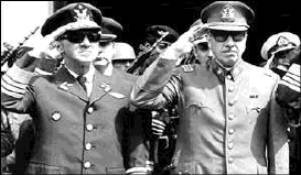
|
Manuel Contreras and General Pinochet |
1976, South America: "Operation Condor" Cross-Border Killing
By Edward Herman, Professor Emeritus, Finance, Wharton School, University of Pennsylvania.
In 1976, six National Security States of Latin America - Argentina, Bolivia, Brazil, Chile, Paraguay and Uruguay - entered into an agreement to monitor and assassinate dissident refugees in member countries. The program was initiated by Chile's secret police, the Directorate of National Intelligence (DINA). Chile organized meetings in Santiago and provided initial funding, computers and centralized services.
The U.S. deserves a great deal of credit for this important development, partly as sponsor and adviser to DINA and other participating security services, but also because Operation Condor was the culmination of a long sought U.S. objective - coordinating the struggle against "communism" and "subversion." In 1968, U.S. General Robert Porter stated: "To facilitate the coordinated employment of internal security forces within and among Latin American countries, we are... endeav-oring to foster inter-service and regional cooperation by assisting in the organization of integrated command and control centers; the establishment of common operating procedures and the conduct of joint and combined training exercises." Condor was one of the fruits of this effort.
Under Operation Condor, political refugees, for example, who leave Uruguay and go to Argentina will be identified and kept under surveillance by Argentinian "security" forces, which will inform Uruguayan "security" forces of the presence of these individuals. If Uruguayan security forces wish to murder these refugees, Argentine forces will cooperate. They will keep the Uruguayans informed of the refugees' whereabouts. They will allow Uruguay's security forces to travel freely in Argentina and to take the refugees into custody, torture and murder them and the Argentinians will claim no knowledge of these events.
Under this system, two former Uruguayan Senators, one a former President of the Senate, Zelmar Michelini and Hector Gutierrez Ruiz, were kidnapped, tortured and murdered in Buenos Aires. Michelini's daughter, Margarita, was also seized and "disappeared."
By July 1976, some 30 Uruguayan exiles, registered as refugees with UN officials in Buenos Aires, were taken into custody and disappeared, surely murdered. Subsequently, several hundred more Uruguayans were picked up and never seen again. Argentine authorities did not acknowledge these arrests.
As reported by de Onis, "Chilean exiles were handed across to Chilean secret police and have not been heard of since. Gen. Juan Jose Torres, a former President of Bolivia, was kidnapped in Buenos Aires and found dead in an automobile trunk. Gen. Carlos Prats Gonzalez, commander-in-chief of the Chilean Army under President Allende, was killed in Argentina. A similar network of intelligence operations has also worked between Brazil and Uruguay. Persons abducted in Brazil, with cooperation from local political police, wound up in Uruguayan jails." More than 200 Uruguayans were abducted and murdered.
The terror network threw fear into the hearts of thousands of political refugees in the Operation Condor states. They saw themselves without a safe haven or any protection by legal process. As this extensive and terrible form of transnational terrorism flowed from U.S. policy efforts and perceived interests, it has not received much notice in the U.S. mass media.
This murder network soon extended its operations beyond the borders of the six participating countries. An FBI agent assigned to Buenos Aires, describing Operation Condor, called attention to "a more secret phase" which "involves the formation of special teams from member countries to travel anywhere in the world to non-member countries to carry out sanctions, [including] assassinations, against terrorists or supporters of a terrorist organization from Operation Condor member countries."
Data are lacking on the scope of this global phase of Operation Condor, which is difficult to distinguish from unilateral international terrorism carried out by the Argentine or Chilean secret police or one of their contract agents, often members of the Cuban-exile terrorist network. Kid-nappings, murders and attempted murders in Mexico and Italy were proclaimed by the Cuban Squad Zero from 1975 onward, some surely under contract with DINA.
Source: Excerpted from The Real Terror Network, 1998. South End Press.
www.thirdworldtraveler.com/Herman%20/Condor_Herman.html
Manuel Contreras
paid CIA informant (1974-1977)
General Pinochet's closest friend and confidant (1974-1979)
head of DINA, Chile's secret police, which was responsible for kidnappings, torture and disappearances in Chile (1974-1978).
met high-level intelligence officials in Argentina, Bolivia, Paraguay, Venezuela and U.S. to discuss Operation Condor (1974) and met Vernon Walters, Assistant Director of the CIA (1975)
plotted the assassination of Orlando Letelier (former Chilean Foreign Minister and ambassador to the U.S.) in Washington (1976)
sentenced by a Chilean court to 7 years for the murder of Letelier and sentenced in his absence by an Italian court to 20 years, for the attempted murder, in 1975, of Italian politician Bernardo Leighton (1995)
Sources: www.lakota.clara.net/terror.html; BBC News, Sept.19, 2000; and P.Kornbluh, The Nation, Aug.9/16, 1999.